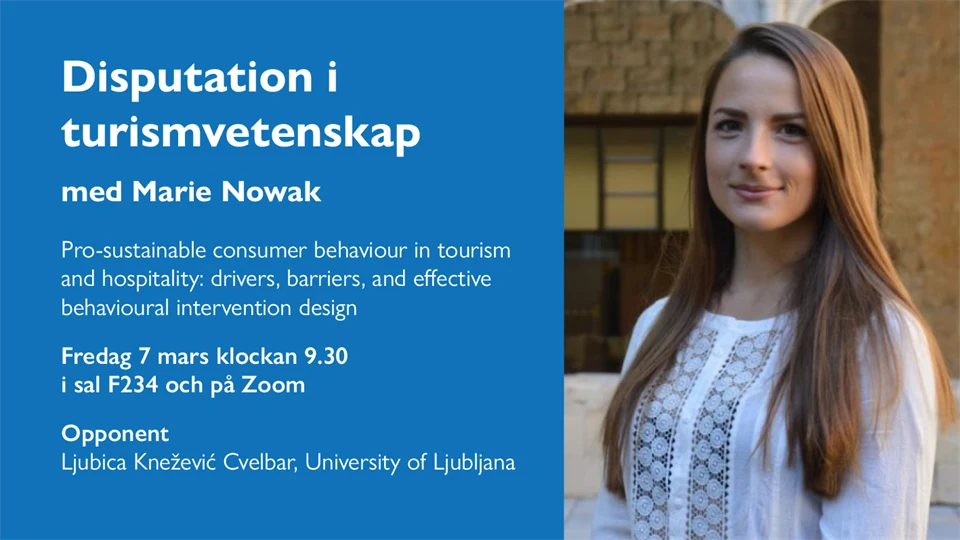Disputation i turismvetenskap med Marie Nowak
Varmt välkommen till disputation i turismvetenskap där Marie Nowak försvarar sin avhandling i turismvetenskap "Pro-sustainable consumer behaviour in tourism and hospitality: drivers, barriers, and effective behavioural intervention design".
Datum: Fredag 7 mars
Tid: 09:30-12:00 med efterföljande mingel och fika
Plats: sal F234, campus Östersund och digitalt via Zoom
Efter disputationen samlas vi för mingel och fika, och för att delta behöver du anmäla dig senast den 21 februari.
Anmäl dig till mingel och fika
Huvudhandledare
Professor Maria Lexhagen, Mittuniversitetet
Biträdande handledare
Docent Tobias Heldt, Högskolan Dalarna
Opponent
Professor Ljubica Knežević Cvelbar, University of Ljubjana
Betygsnämnd
Docent Ioanna Farsari, Högskolan Dalarna
Docent Erik Lundberg, Handelshögskolan, Göteborgs Universitet
Docent Anna Sörensson, Mittuniversitetet
Abstract (in english)
Amid escalating global sustainability challenges, tourism and hospitality (T&H) has emerged as an important arena for understanding and fostering pro-sustainable consumer behaviour. The hedonic priorities and complexity of decision-making in T&H often exacerbate the gap between stated attitudes and actual pro-sustainable behaviour, which contributes to issues like climate change. However, these contexts also offer opportunities to better understand and influence pro-sustainable behaviour through tailored interventions.
Behavioural interventions like nudges have shown promise in terms of guiding behaviour towards desirable outcomes by modifying decision-making environments based on behavioural economics. However, gaps remain with regard to understanding pro-sustainable behaviours across diverse T&H settings and developing effective interventions that T&H providers can implement to enhance informed consumer choices without compromising their experience.
This thesis addresses these gaps by using a mixed-method field experimental approach to study pro-sustainable behaviour in twodistinct T&H contexts: donations for mountain-biking trails in Rörbäcksnäs, Dalarna (Sweden), and climate-friendly food choices in restaurants in the Swedish locations of Sälen, Dalarna, and Stockholm. Each setting involved two field experiments – testing social norms and carbon label interventions – which together constitute four independent papers. This field experimental approach not only provides insights into real-life behavioural processes but also incorporates providers’ perspectives on promoting pro-xii sustainable options, informing the design of context-relevant interventions.
The findings culminate in a framework that researchers, providers, and policymakers can use to design and test behavioural interventions that foster pro-sustainable consumer behaviour in T&H and other out-of-home consumption domains. Methodologically, this framework emphasises the importance of collaborative design and iterative adaptation of interventions based on field experiments, to effectively bridge theory and practice in T&H sustainability. Theoretically, the research offers new insights into pro-sustainable consumer behaviour, highlighting the significant influence of social norms and contextual factors across diverse T&H settings. Practically, the study stresses the need to align interventions with the context-specific goals of consumer segments, showcasing the value of tailored social norm interventions, carbon labels, and staff engagement in promoting pro-sustainable choices while preserving the overall consumer experience.
